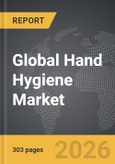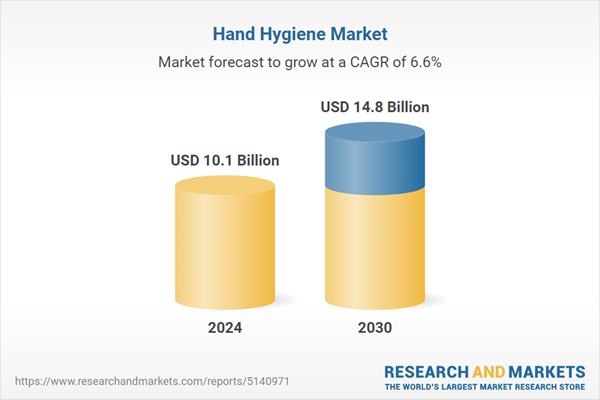Global Hand Hygiene Market - Key Trends and Drivers Summarized
Why Is Hand Hygiene Becoming Essential for Public Health and Infection Control?
Hand hygiene has become one of the most critical aspects of public health, playing a vital role in preventing the spread of infections and maintaining overall well-being. But why is hand hygiene so important today? The global COVID-19 pandemic highlighted how vital proper hand hygiene is in reducing the transmission of viruses and bacteria. Handwashing and the use of hand sanitizers are simple yet highly effective practices that can prevent the spread of pathogens, not only in hospitals and healthcare settings but also in everyday life.“Clean hands save lives,” is a statement that underscores the power of something as simple as washing hands in reducing infection rates. Beyond pandemic control, hand hygiene is essential for curbing the spread of various illnesses like the flu, common cold, and gastrointestinal infections. From schools and workplaces to public spaces, maintaining good hand hygiene is now seen as an everyday responsibility that protects not only the individual but the community at large.
How Are Technological Advancements and Innovations Enhancing Hand Hygiene Practices?
Technological advancements and innovations are greatly improving hand hygiene practices, making it easier, faster, and more effective for individuals to maintain cleanliness. One of the key innovations is the development of sensor-based, touchless dispensers for hand sanitizers and soap. These devices reduce the risk of cross-contamination by eliminating the need for physical contact, ensuring that users can clean their hands without touching potentially contaminated surfaces. This hands-free approach, especially in high-traffic areas like hospitals, airports, and restaurants, enhances hygiene by minimizing the spread of germs. Another significant advancement is the development of alcohol-based hand sanitizers that are effective at killing a broad spectrum of germs, including bacteria, viruses, and fungi. The introduction of moisturizing formulas has also addressed concerns about skin irritation, making frequent use of hand sanitizers more comfortable.Artificial intelligence (AI) and smart technologies are now being integrated into hand hygiene compliance systems, particularly in healthcare settings. AI-powered devices can monitor hand hygiene practices among healthcare workers, providing real-time feedback and reminders. These systems ensure that healthcare professionals follow proper handwashing protocols, which are crucial in preventing hospital-acquired infections. Additionally, ultraviolet (UV) hand hygiene stations are being used to visually show users the areas on their hands that were missed during washing, further improving effectiveness and compliance.
Why Is Hand Hygiene Critical for Preventing Infections and Promoting Public Health?
Hand hygiene is critical for preventing infections and promoting public health because it directly addresses one of the most common transmission routes for harmful germs: human hands. Dr. Ignaz Semmelweis, the 19th-century Hungarian physician, discovered, handwashing can drastically reduce the spread of infection. Semmelweis' work in reducing maternal mortality through hand hygiene laid the foundation for modern infection control practices, proving that simple actions can lead to significant health benefits. Today, hand hygiene is seen as the first line of defense against infections. The Centers for Disease Control and Prevention (CDC) emphasizes that regular handwashing with soap and water can reduce the spread of diarrhea-related illnesses by up to 40% and respiratory infections by up to 20%. In healthcare settings, proper hand hygiene is essential for reducing the transmission of healthcare-associated infections (HAIs), which can lead to prolonged hospital stays, increased healthcare costs, and even fatalities. In everyday life, hand hygiene is essential for keeping germs from spreading in environments such as schools, offices, public transportation, and homes. By practicing proper hand hygiene, people can protect themselves and others from illnesses like colds, flu, foodborne diseases, and even life-threatening infections like COVID-19.What Factors Are Driving the Growth of Hand Hygiene Solutions and Practices?
Several key factors are driving the growth of hand hygiene solutions and practices, including heightened awareness following the COVID-19 pandemic, increased focus on infection prevention in healthcare, advancements in hygiene products, and the role of public health campaigns. First, the global pandemic made hygiene a top priority for individuals, businesses, and governments alike. This heightened awareness has made hand hygiene a permanent part of public life, with facilities from shopping malls to workplaces installing hand sanitizer dispensers and educating the public on the importance of regular handwashing.In healthcare, the emphasis on preventing HAIs has driven the demand for more effective and accessible hand hygiene solutions. Hospitals and clinics are investing in touch-free sanitizer dispensers, smart monitoring systems, and educational programs to ensure that both healthcare workers and patients maintain proper hygiene standards. The development of innovative hygiene products, such as alcohol-free sanitizers and environmentally friendly soaps, is also contributing to market growth. These products appeal to consumers who are concerned about the environmental impact of traditional sanitizers and soaps, as well as those with sensitive skin who seek alternatives to alcohol-based products. The growing trend toward natural and sustainable ingredients in hand hygiene products is attracting health-conscious consumers who prioritize both personal and environmental health.
Lastly, global public health campaigns have played a significant role in promoting hand hygiene practices. World Hand Hygiene Day, established by the WHO, and similar campaigns have raised awareness about the importance of regular handwashing and sanitization. These efforts have been instrumental in embedding hand hygiene as a key component of personal and public health, fostering habits that will likely persist long after the pandemic.
In conclusion, the growth of hand hygiene solutions and practices is driven by increased awareness of the importance of cleanliness, advancements in hygiene technology, and the need to prevent infections in both healthcare and public settings. As technological innovations continue to make hand hygiene more accessible, effective, and convenient, this simple yet powerful practice will remain a cornerstone of public health and personal wellness.
Report Scope
The report analyzes the Hand Hygiene market, presented in terms of market value (USD). The analysis covers the key segments and geographic regions outlined below.- Segments: Type (Hand Sanitizers, Hand Wash, Soaps, Lotions & Creams, Other Product Types); Distribution Channel (Pharmacy Stores, Online Stores, Departmental Stores, Other Distribution Channels); End-Use (Commercial, Industrial, Residential).
- Geographic Regions/Countries: World; USA; Canada; Japan; China; Europe; France; Germany; Italy; UK; Spain; Russia; Rest of Europe; Asia-Pacific; Australia; India; South Korea; Rest of Asia-Pacific; Latin America; Argentina; Brazil; Mexico; Rest of Latin America; Middle East; Iran; Israel; Saudi Arabia; UAE; Rest of Middle East; Africa.
Key Insights:
- Market Growth: Understand the significant growth trajectory of the Hand Sanitizers segment, which is expected to reach US$6.3 Billion by 2030 with a CAGR of 7.5%. The Hand Wash segment is also set to grow at 6.5% CAGR over the analysis period.
- Regional Analysis: Gain insights into the U.S. market, valued at $2.6 Billion in 2024, and China, forecasted to grow at an impressive 10% CAGR to reach $3.6 Billion by 2030. Discover growth trends in other key regions, including Japan, Canada, Germany, and the Asia-Pacific.
Why You Should Buy This Report:
- Detailed Market Analysis: Access a thorough analysis of the Global Hand Hygiene Market, covering all major geographic regions and market segments.
- Competitive Insights: Get an overview of the competitive landscape, including the market presence of major players across different geographies.
- Future Trends and Drivers: Understand the key trends and drivers shaping the future of the Global Hand Hygiene Market.
- Actionable Insights: Benefit from actionable insights that can help you identify new revenue opportunities and make strategic business decisions.
Key Questions Answered:
- How is the Global Hand Hygiene Market expected to evolve by 2030?
- What are the main drivers and restraints affecting the market?
- Which market segments will grow the most over the forecast period?
- How will market shares for different regions and segments change by 2030?
- Who are the leading players in the market, and what are their prospects?
Report Features:
- Comprehensive Market Data: Independent analysis of annual sales and market forecasts in US$ Million from 2024 to 2030.
- In-Depth Regional Analysis: Detailed insights into key markets, including the U.S., China, Japan, Canada, Europe, Asia-Pacific, Latin America, Middle East, and Africa.
- Company Profiles: Coverage of players such as 3M Company, Allcura Naturheilmittel GmbH, Alsace Protection, Amethyst Wellness, Amity International and more.
- Complimentary Updates: Receive free report updates for one year to keep you informed of the latest market developments.
Some of the 163 companies featured in this Hand Hygiene market report include:
- 3M Company
- Allcura Naturheilmittel GmbH
- Alsace Protection
- Amethyst Wellness
- Amity International
- Amway Corporation
- Angelini Pharma, Inc.
- Askon Hygiene Products Pvt., Ltd.
- Astral Hygiene Ltd
- Atramex
This edition integrates the latest global trade and economic shifts into comprehensive market analysis. Key updates include:
- Tariff and Trade Impact: Insights into global tariff negotiations across 180+ countries, with analysis of supply chain turbulence, sourcing disruptions, and geographic realignment. Special focus on 2025 as a pivotal year for trade tensions, including updated perspectives on the Trump-era tariffs.
- Adjusted Forecasts and Analytics: Revised global and regional market forecasts through 2030, incorporating tariff effects, economic uncertainty, and structural changes in globalization. Includes historical analysis from 2015 to 2023.
- Strategic Market Dynamics: Evaluation of revised market prospects, regional outlooks, and key economic indicators such as population and urbanization trends.
- Innovation & Technology Trends: Latest developments in product and process innovation, emerging technologies, and key industry drivers shaping the competitive landscape.
- Competitive Intelligence: Updated global market share estimates for 2025, competitive positioning of major players (Strong/Active/Niche/Trivial), and refined focus on leading global brands and core players.
- Expert Insight & Commentary: Strategic analysis from economists, trade experts, and domain specialists to contextualize market shifts and identify emerging opportunities.
Table of Contents
Companies Mentioned (Partial List)
A selection of companies mentioned in this report includes, but is not limited to:
- 3M Company
- Allcura Naturheilmittel GmbH
- Alsace Protection
- Amethyst Wellness
- Amity International
- Amway Corporation
- Angelini Pharma, Inc.
- Askon Hygiene Products Pvt., Ltd.
- Astral Hygiene Ltd
- Atramex
Table Information
| Report Attribute | Details |
|---|---|
| No. of Pages | 303 |
| Published | February 2026 |
| Forecast Period | 2024 - 2030 |
| Estimated Market Value ( USD | $ 10.1 Billion |
| Forecasted Market Value ( USD | $ 14.8 Billion |
| Compound Annual Growth Rate | 6.6% |
| Regions Covered | Global |









